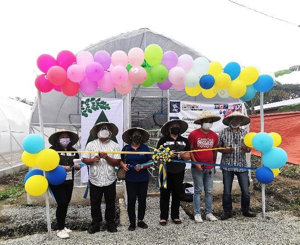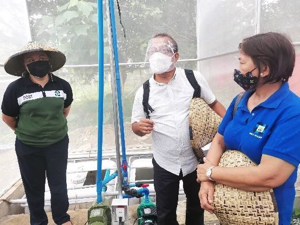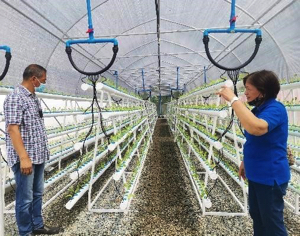 Underprivileged children at Bukid Kabataan Center in General Trias, Cavite and selected areas in Metro Manila will benefit from the Gulayan sa Pamayanan project of the Department of Science and Technology Regional Office IV-A (DOST IV-A - CALABARZON) and DOST-Philippine Council for Agriculture, Aquatic and Natural Resources Research and Development (DOST-PCAARRD). All vegetable harvests from the project will be distributed freely to the underprivileged beneficiaries for food security.
Underprivileged children at Bukid Kabataan Center in General Trias, Cavite and selected areas in Metro Manila will benefit from the Gulayan sa Pamayanan project of the Department of Science and Technology Regional Office IV-A (DOST IV-A - CALABARZON) and DOST-Philippine Council for Agriculture, Aquatic and Natural Resources Research and Development (DOST-PCAARRD). All vegetable harvests from the project will be distributed freely to the underprivileged beneficiaries for food security.
This ongoing PCAARRD-funded and monitored project, "Employing Hydroponics and Vegetable Gardening Technologies to Alleviate COVID-19 Threats to Food Security in Selected Municipalities in Region IV-A" is implemented by DOST IV-A led by Mr. Fernando E. Ablaza, Director of the Provincial Science and Technology Center (PSTC) - Rizal.
The project has two sites - in General Trias, Cavite and in Angono, Rizal. It is part of the GALING-PCAARRD Kontra CoViD-19 Program - Component 3 - Pagkain at Kabuhayan sa Pamayanan.
According to Jazzner De Dios, Program Manager of Bukid Kabataan Center, aside from the children- beneficiaries in General Trias, Cavite, around 10,000 malnourished and hungry children in Metro Manila will also benefit from the project. He mentioned that their main objective is to use less manpower, less inputs, and less space to grow more vegetables for the communities.
 This was shared during the recently-conducted DOST IV-A’s Greenhouse Launching at Bukid Kabataan Center in General Trias, Cavite. According to DOST IV-A Regional Director Emelita P. Bagsit, the project is timely since the agricultural lands are diminishing due to their conversion into other purposes such as subdivisions and shopping malls. In a small space with just one greenhouse, 7,000 lettuce seedlings can already be grown through hydroponics technology.
This was shared during the recently-conducted DOST IV-A’s Greenhouse Launching at Bukid Kabataan Center in General Trias, Cavite. According to DOST IV-A Regional Director Emelita P. Bagsit, the project is timely since the agricultural lands are diminishing due to their conversion into other purposes such as subdivisions and shopping malls. In a small space with just one greenhouse, 7,000 lettuce seedlings can already be grown through hydroponics technology.
The greenhouse will be managed by two persons only, unlike in conventional farms where more space and more farmers are needed to take care of 7,000 seedlings.
The improved greenhouse design, local materials, hydroponics technology, and vegetable seeds are made possible through the PCAARRD-funded projects led by Dr. Chito F. Sace, Professor from the Central Luzon State University (CLSU). Dr. Sace further emphasized that the greenhouse design and the hydroponics technology are products of his research at CLSU, also funded by DOST-PCAARRD and Taiwan Agricultural Research Institute (TARI). He said that DOST-PCAARRD funded a total of three projects to establish demo farms at CLSU, where he show-cased his studies on greenhouses, hydroponics, and aquaponics. PCAARRD and CLSU also conducted several training courses on hydroponics for different institutions in the country to promote the adoption of the technology.
 PCAARRD Executive Director Reynaldo V. Ebora thanked and congratulated DOST IV-A for its patience and determination despite the constraints brought about by COViD-19 pandemic. He said that establishing the greenhouse structures and the procurement procedures may have not been that easy, but with their diligence, these became possible.
PCAARRD Executive Director Reynaldo V. Ebora thanked and congratulated DOST IV-A for its patience and determination despite the constraints brought about by COViD-19 pandemic. He said that establishing the greenhouse structures and the procurement procedures may have not been that easy, but with their diligence, these became possible.
Before the end of the project, two more greenhouses with hydroponics and aquaponics technologies will be completed and used for growing different kinds of vegetables.
